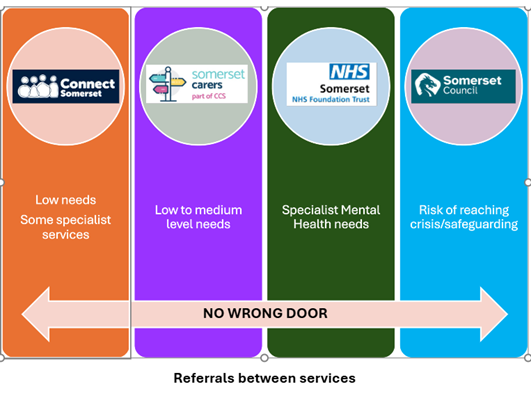Unpaid Carers
Context
Somerset Council provides, commissions and contributes to a range of services described as a ‘No wrong door approach’ to support unpaid carers. This consists of carers with a low level of need being supported at a community level (e.g. at Talking Cafes) and those with low to medium level needs via the Somerset Carers Service (delivered via a contract commissioned with the Community Council for Somerset) for low to medium level needs. Those requiring support with specialist Mental Health needs are referred to the Somerset Foundation Trust Carers Support Service to which Somerset Council contributes.

The Somerset NHS Foundation Trust’s Mental Health Carers Support Service comprises of a team who specialise in supporting the carers of people who have mental health conditions:
- Signposting on how to access benefits and benefit support.
- Getting a break or holiday (alone or with the person they care for)
- Befriending services
- Accessing advocacy
- Support for physical health needs
- Education sessions
- Peer support via groups
- A listening ear in times of brief crisis
Carers can be referred or self-refer for a carers’ assessment providing the person that they support is registered with Somerset mental health services. The carers’ services team are based within community mental health teams across Somerset.
The Carers Support Service is commissioned by Somerset Council and delivered by the Community Council for Somerset and includes:
- Information and advice
- Carers Support Groups
- One to one support
- Training
- On-line resources
- Sign post to other organisations
- Longer term support
- Contingency and escalation planning
- Carers breaks
- Carers events
For medium level needs where there are complex needs for the cared for or communication/confidence needs for the Carer, a referral onto specialist support via SFT or Somerset Council will be actioned.
Carers are also supported in hospitals through the Single Point of Contact Team that includes the Carers Support Service, Red Cross and Acute staff. This offers a much more joined up approach to supporting effective discharge of patients and their Carers back home, fully utilising community support services.
Current status
Somerset Council commissions the Carers Support Service and contributes funding to Somerset NHS Foundation Trust’s Carers Support Service.
Data
Spend during 2024/25: £523,183
Distance from desired commissioning objectives
Somerset Council and its partners remain committed to supporting carers, in order to meet statutory duties as well as recognising the vital role of carers in supporting health and social care systems. This is outlined in our Commitment to Carers 2024 document: Carers in Somerset
In order to enhance the lives of unpaid carers in Somerset, those who commission, provide and support health and social care services are encouraged by the Commitment to embed the following priorities into all aspects of their work:
- Enable, support and empower unpaid carers, including young carers
- Develop and embed new approaches
- Create and facilitate social opportunities
Progress against the Commitment priorities and an evaluation of the impact of the activity is reported to the Somerset Carers Strategic Partnership Board. Work is underway to compile a suite of outcome measures to focus on impact which will be adopted by both the commissioned Carers Support Service and the NHS Foundation Trust’s service that the Council contributes to. A performance dashboard will support the interrogation and use of this data.
Risks
- Individuals in caring roles may not identify as a carer and therefore do not access the support available to them.
- Recruitment and retention of staff is challenging in the current market.
Current areas of focus for commissioners
- Work to expand the Carers Support Service digital offer (including the exploration of virtual assistance) so that carers can access support digitally 24/7.
- Building on the successful trial of a Carers Information Day, Somerset Council and the Carers Service will be running further days across the County.
- Exploring the feasibility of replicating the innovative approach trialled at the Carers Information Day (of providing carers assessments in a drop-in environment) at GP surgeries on a regular basis.
- Developing outcome measures to evaluate impact for individuals and the economic value of preventative based carers services.
- Continuing and increasing mechanisms to listen and gain insight into the lived experiences of carers to help shape services and inform future commissioning decisions.
[1] https://www.ons.gov.uk/peoplepopulationandcommunity/healthandsocialcare/healthandwellbeing/bulletins/unpaidcareenglandandwales/census2021
